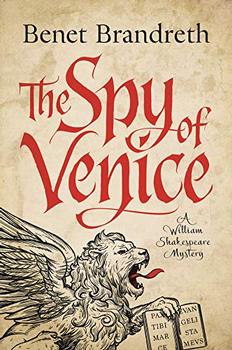Summary | Excerpt | Reviews | Beyond the Book | Read-Alikes | Genres & Themes | Author Bio

Critics' Opinion:
Readers' Opinion:
First Published:
Aug 2018, 448 pages
Paperback:
Dec 2019, 448 pages
 Book Reviewed by:
Book Reviewed by:
Donna Chavez
Buy This Book
This article relates to The Spy of Venice
In Benet Brandreth's The Spy of Venice, William Shakespeare is a brilliant wordsmith but still a young man with all of a young man's appetite for adventure and women. He's witty with a rapier-like pen and rakish sense of humor. But wait. Many people reading Shakespeare's plays might doubt that the Bard of Avon had much of a sense of humor at all. Even the so-called comedies, they might argue, are only moderately humorous.
So is Brandreth's characterization of a brilliantly witty Shakespeare total fabrication? Or is it conceivable that old Will might have been the Stephen Colbert of his time? Very much so the latter. The operative word to consider is "time." As with anything intended to be funny, two of the most important considerations are context and mode of delivery - in this case, specifically the double entendre.
The double entendre is a phrase that can be interpreted in two ways, one which is innocuous, the other which is usually bawdy. It's been in use for a long time - for example, The Canterbury Tales (14th century) are filled with them. From The Great British Baking Show to Benny Hill to 007 or the Carry On series of movies, the double entendre seldom fails to deliver a laugh. It has always been, and remains, popular where audiences are squeamish talking openly about certain topics, usually sex.
In Shakespeare's day, his double entendres were just that. The Elizabethan era had a strictly enforced social structure and each stratum had its own code of conduct. The code covered everything from dress to speech patterns to proper topics for discussion. Certain topics, no matter how powerfully they occupied one's mind, were never discussed, and so a common method for addressing them was via the double entendre.
Take, for instance, this line from Much Ado About Nothing Act 5, Scene 2 when Benedick says: "I will live in thy heart, die in thy lap, and be buried in thy eyes."
As Mental Floss explains: "In Elizabethan slang, 'to die' was a euphemism for sexual climax, so Benedick telling his lover, Beatrice, that he will 'die' in her lap has less-than-chaste implications. It should also be noted that the title of the play itself is a dirty pun; remember, 'nothing' was an Elizabethan euphemism for a woman's lady parts."
The era and context of the double entendre dictates whether it will be well received or not. Clearly language, politics, and even pronunciation have changed over the last five centuries. Thus Shakespeare's jokes can lose all meaning to the 21st century audience. But make no mistake. William Shakespeare wrote jokes and puns into just about every play that had audiences either rolling in the aisle or demurely tittering behind a delicately gloved hand.
Filed under Cultural Curiosities
![]() This "beyond the book article" relates to The Spy of Venice. It originally ran in August 2018 and has been updated for the
December 2019 paperback edition.
Go to magazine.
This "beyond the book article" relates to The Spy of Venice. It originally ran in August 2018 and has been updated for the
December 2019 paperback edition.
Go to magazine.





The Flower Sisters
by Michelle Collins Anderson
From the new Fannie Flagg of the Ozarks, a richly-woven story of family, forgiveness, and reinvention.

The House on Biscayne Bay
by Chanel Cleeton
As death stalks a gothic mansion in Miami, the lives of two women intertwine as the past and present collide.

The Funeral Cryer by Wenyan Lu
Debut novelist Wenyan Lu brings us this witty yet profound story about one woman's midlife reawakening in contemporary rural China.
Your guide toexceptional books
BookBrowse seeks out and recommends the best in contemporary fiction and nonfiction—books that not only engage and entertain but also deepen our understanding of ourselves and the world around us.